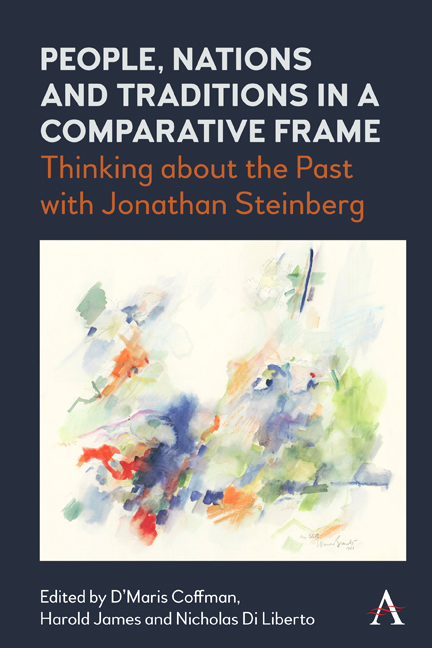 People, Nations and Traditions in a Comparative Frame
People, Nations and Traditions in a Comparative Frame Book contents
- Frontmatter
- Contents
- Foreword
- Acknowledgements
- Notes on Contributors
- Introduction
- Part One Methodological Pluralism and New Applications
- Part Two Personal and National Character
- Part Three Society, Families and the Sovereign Self
- Part Four History Out of Sync: Modernity and Tradition
- Part Five History, Narrative and the Human Condition
- Afterword
- Bibliography of Jonathan Steinberg’s Works
- Index
Chapter Nine - The Family of Sovereigns at Modern Times
Published online by Cambridge University Press: 23 February 2022
- Frontmatter
- Contents
- Foreword
- Acknowledgements
- Notes on Contributors
- Introduction
- Part One Methodological Pluralism and New Applications
- Part Two Personal and National Character
- Part Three Society, Families and the Sovereign Self
- Part Four History Out of Sync: Modernity and Tradition
- Part Five History, Narrative and the Human Condition
- Afterword
- Bibliography of Jonathan Steinberg’s Works
- Index
Summary
Political Anarchism and the Family
In the nineteenth century, a series of cooperative movements – some infamous, some obscure – experimented with the traditional family structure, adopting a wide range of unorthodox practices from celibacy to free love to polygamy. These practices were an attempt to refashion the family. These movements set about to determine whether the natural sympathy that exists within the family is qualitatively commensurable, or at least practically compatible, with the general benevolence that makes social life possible. They recognized that the family, with its partialities and particular obligations, is grounded on both benevolence and egotism, and that as such, it is both a profoundly social and profoundly unsocial institution. Recognizing this dualism, these thinkers struggled to determine whether in its relation to society the family ought to be considered a school of sympathy or a school of selfishness. This puzzle evolved into a complex set of social, moral and even scientific questions to which this article will refer collectively as ‘the family question’. What follows is an excerpt from a larger survey of four cooperative movements – Owenism, Oneida, Mormonism and Modern Times – and their engagement with the family question. For the sake of brevity this article will focus on one, the political radicals at Modern Times, New York.
Josiah Warren founded Modern Times in 1851 on the principle of ‘sovereignty of the individual’ with the addendum ‘to be exercised at his own cost’. In practice this meant there was no political leadership at Modern Times because, as Warren once wrote to John Humphrey Noyes, ‘there is no “Chief “ in that sense of the word, where all are “Sovereigns”’.
Josiah Warren acquired his experience with communal living and collective ownership at New Harmony, Indiana, as a supporter of Robert Owen's American experiment, but after reflecting on the failure of Owenite socialism in that venture, Warren concluded that the defect of communism was, in fact, communism itself. Warren tested his ‘time store’ or ‘equity store’ – where he sold goods at cost with a small mark-up for his labour – and after he had convinced himself of its success, he moved to New York in 1850, where he met the radical reformer Stephen Pearl Andrews, whom he soon converted from Fourierism to his own doctrines. Together he and Andrews set out to found a cooperative community based on Warren's principles.
- Type
- Chapter
- Information
- People, Nations and Traditions in a Comparative FrameThinking about the Past with Jonathan Steinberg, pp. 131 - 150Publisher: Anthem PressPrint publication year: 2021


